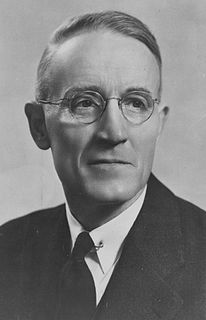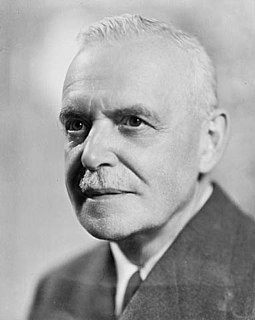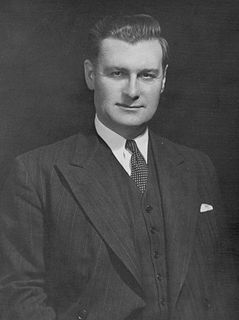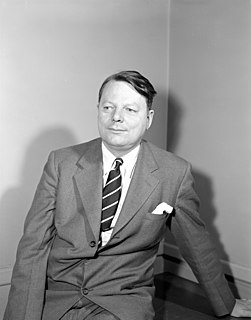
John George Diefenbaker was the 13th prime minister of Canada, serving from June 21, 1957 to April 22, 1963. He was the only Progressive Conservative party leader after 1930 and before 1979 to lead the party to an election victory, doing so three times, although only once with a majority of seats in the House of Commons of Canada.

The Minister of Foreign Affairs is the Minister of the Crown in the Canadian Cabinet who is responsible for overseeing the federal government's international relations and heads the Department of Global Affairs, though the Minister of International Trade leads on international trade issues. In addition to the Department, the Minister is also the lead in overseeing the International Centre for Human Rights and Democratic Development and the International Development Research Centre.

The Canadian federal election of 1957 was held June 10, 1957, to select the 265 members of the House of Commons of Canada. In one of the great upsets in Canadian political history, the Progressive Conservative Party, led by John Diefenbaker, brought an end to 22 years of Liberal rule, as the Tories were able to form a minority government.

Joseph James Guillaume Paul Martin,, often referred to as Paul Martin, Sr, was a noted Canadian politician and diplomat. He was the father of Paul Martin, who served as 21st Prime Minister of Canada from 2003 to 2006.

Robert Henry Winters, was a Canadian politician and businessman.

Howard Charles Green, was a Canadian politician and parliamentarian.

John James "Joe" Greene, was a Canadian politician.

The Liberal Party of Canada leadership election of 1968 elected Pierre Elliott Trudeau as the new leader of the Liberal Party. He was the unexpected winner in what was one of the most important leadership conventions in party history. The Globe and Mail newspaper report the next day called it "the most chaotic, confusing, and emotionally draining convention in Canadian political history."
A Liberal Party of Canada leadership election was called for June 16, 1984, to replace retiring Liberal leader and sitting Prime Minister Pierre Trudeau. The convention elected former Finance Minister John Turner, who at the time was not sitting in the House of Commons, as its leader on the second ballot, defeating another former finance minister, Jean Chrétien.
The 1990 Liberal Party of Canada leadership election was held on 23 June 1990 in Calgary, Alberta. The party chose former Deputy Prime Minister Jean Chrétien as its new leader, replacing the outgoing leader, former Prime Minister John Turner.
The 1948 Liberal Party of Canada leadership election was called to replace retiring Liberal leader and sitting Prime Minister William Lyon Mackenzie King. The convention was held exactly 29 years after the 1919 leadership convention that saw King elected Liberal leader.

Lester Bowles "Mike" Pearson was a Canadian scholar, statesman, soldier, prime minister, and diplomat, who won the Nobel Peace Prize in 1957 for organizing the United Nations Emergency Force to resolve the Suez Canal Crisis. He was the 14th prime minister of Canada from 22 April 1963 to 20 April 1968, as the head of two back-to-back Liberal minority governments following elections in 1963 and 1965.
The 1919 Liberal Party of Canada leadership election was the first leadership convention held by a federal political party in Canada. It was originally called by the Liberal leader, Sir Wilfrid Laurier, as a national policy convention with the intention of reinvigorating the Liberal Party after eight years of being in opposition. The convention was also intended to re-unite the party, which had split as a result of the Conscription Crisis of 1917. The party had divided into Laurier Liberals, who remained in opposition, and a Liberal–Unionist faction which joined the wartime Union government of Sir Robert Borden in support of conscription. Laurier's death on February 17, 1919 resulted in the meeting being reconfigured as a leadership convention. Previous party leaders in Canada had been chosen by the parliamentary caucus or the outgoing leader. However, the Liberal caucus no longer felt that it was representative of Canada's linguistic and religious diversity and that allowing the entire party to select the leader would result in a more representative choice.

This article is the Electoral history of Louis St. Laurent, the twelfth Prime Minister of Canada (1948-1957).

This article is the Electoral history of John Diefenbaker, the thirteenth Prime Minister of Canada.

This article is the Electoral history of Lester B. Pearson, the fourteenth Prime Minister of Canada.















